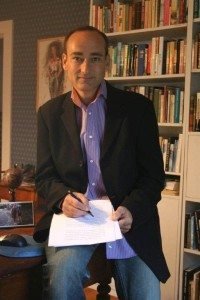LINCOLN, Vt.—Give Chris Bohjalian his family, a bicycle, and a bottle of good wine and he’s one happy fellow.

To say Bohjalian is part of the landscape in this Green Mountain State is putting it mildly. Just stroll into the Bear Pond Book Store in downtown Stowe and you’ll see for yourself.
One entire section is devoted to the author and visitors pore over his books inside a quaint setting. According to one clerk, Bohjalian books are a popular read for both locals and tourists alike.
“We’re constantly upgrading the collection,” she said. “We remain a little partial toward our own writers. Chris Bohjalian enjoys a great deal of popularity around these parts.”
Bohjalian is celebrating his 25th year in Vermont, and how he arrived here from Brooklyn, N.Y. is yet another story. He and his wife were cab-napping one night and had taken a joyride during which the driver ignored all traffic lights and stop signs.
Around midnight, he deposited the young couple on a near-deserted street where police officers were about to storm a crack house.
They were told to hit the ground for their own protection. While lying on the pavement, Bohjalian’s wife suggested that perhaps it was time to move to New England.
Months later, they traded in their co-op in Brooklyn for a century-old Victorian home in Lincoln (population 975) and Bohjalian began chronicling life in that town in a wide variety of magazine essays with his newspaper column, “Idyll Banter.”
It’s been a perpetual diary of both his lifestyle as an urban refugee and how America has evolved over the decades, much like the Erma Bombeck of our time where common experiences are meant to be shared.
Don’t get the idea that because Bohjalian is far removed from the Armenian community that he doesn’t cling to his roots. Fact is, he’s very ethnically oriented and promotes his heritage at every opportunity. He wouldn’t have it any other way, he insists.

“I’ve written about my Armenian heritage in at least a half-dozen essays for different publications,” he’s quick to admit. “That’s a half-dozen more times than I’ve written about my Swedish heritage.”
Bohjalian’s father is Armenian and mother Swedish. Should you visit the blog on his website and search the words “Armenia” and “Armenian,” you’re apt to find some of these columns over the last few years.
After finishing Midwives, Bohjalian embarked upon a novel that tugged upon his Armenian heritage. It’s called Sugar Daddy, set in 1996 in South Beach and 1915 in Istanbul during the genocide.
“It was a truly terrible novel and I decided after reading the first draft that it wasn’t salvageable,” he recalled. “So I scrapped it and wrote another.”
In its place was the best-seller, The Law of Similars.
The abandoned manuscript exists in the archives at the Robert Frost Library—his alma mater. Bohjalian’s literary executor has instructions that it can never be published, though people can read it while in the library and quote from it in scholarly papers.
Now, Bohjalian is planning a novel on the Armenian Genocide to be published in 2014 on the advent of its centennial.
“I failed in 1996,” he said. “But I’m older now. I may not be wiser but I’m at least more experienced.”
When that occurs, he’ll prepare some type of meaningful connection with Armenian organizations and charities. He did that with two other books, The Double Bind and Secrets of Eden, and it seemed an effective way to generate awareness on such issues as homelessness and violence against women.
Not one to rest on his laurels—or rest period—Bohjalian is already working on his next book, called The Body Garden. It’s about a pilot who fails to ditch a jet successfully after a bird strike takes out both engines. Thirty-nine of his 48 passengers die on impact or drown. But the pilot lives.
“A part of the book is about being a pilot in a post-Sully Sullenberger world who fails to accomplish what Sully did,” Bohjalian explains. “The other parts? Witchcraft and ghosts.”
In a small community such as Vermont where Armenians are few and far between, Bohjalian has his own way of passing the culture onto his daughter, now 16.
“It helps that I’m a storyteller,” he says. “My daughter has always been fascinated by the tales I have shared of her Armenian great-grandparents, her grandfather, and aunt.”
Like his compatriots, Bohjalian feels it’s time for America to step forward and recognize the genocide in conjunction with his 2008 novel, Skeletons of the Feast.
“In part, it’s about the complicity of an average German family in the Holocaust,” he points out. “Last year I heard Gerda Weissmann Klein speaking at the Hittel at the University of Texas. Someone asked her what to say about Holocaust deniers.”
“She told them to ask the German government if there was a Holocaust and they don’t deny it.”
With the golden anniversary this year of Harper Lee’s blockbuster To Kill a Mockingbird, Bohjalian owns a first-edition copy, took his crayons as a child and added colorful birds to the muted leaves on the tree that adorns the cover.
He first read the book as an eighth-grader, but not as a class assignment, and was more than moved by it, no doubt launching an insatiable passion to write himself some day.
“That might be the story that fueled my desire to become a novelist,” he confirms. “Perhaps it was inevitable, a small ‘Mockingbird’ backlash. Maybe the book isn’t timely, but it remains timeless.”
A typical writing day begins at 6 a.m. and goes to noon. He’ll share lunch with his “bride,” then delve into some research for whatever the book may be. That’s usually followed by a visit to the gym or a bike ride (he’s an avid cyclist), dinner, whatever marketing is on his agenda, read, and sleep.
Admittedly, Bohjalian happens to be a vegetarian and could live on cheese boeregs, ghataif, and tahn. He savors the movies of Atom Egoyan and lists Peter Balakian’s Black Dog of Fate as his favorite Armenian author and book.
“His story felt like my childhood, too,” he says.
Add the names of Nancy Kricorian and Micheline Aharonian Marcom to that list.
If he could sit across the dinner table with any notable Armenian, it would be Serge Sarkisian, the president of Armenia. And what would they discuss?
“The principal issues facing Armenia,” said Bohjalian. “What does it need most from the United States? Where does it see itself as a nation 10 years down the road? Fifty years from now?”
Bohjalian keeps abreast of Armenian news through the ethnic press. He receives the digital editions and would like to read more if time allowed. He’s no slouch when it comes to keeping up with current affairs. On his website is an interview conducted by Armenian Weekly editor Khatchig Mouradian some years back.
Given the way both journalism and fiction are beleaguered these days, Bohjalian sees a vital link between the two mediums.
“Each field matters,” he believes. “One feeds a free republic and the other feeds the soul. Both are changing in ways very few people saw 15 years ago.”
What tip would he give to aspiring writers?
“Write one terrific sentence,” he suggests. “Don’t worry about anything else—not where the story is going, not where it should end. Don’t pressure yourself to write 500 or 1,000 words at one clip. Just write 10 or 15 ones that are very, very sound.”
Anything else? A devious smile crosses his face.
“Lie. Put down on paper the most interesting lies you can imagine—and then make them plausible.”
Thumbnail sketch
Chris Bohjalian is the author of 13 books, including his brand new novel, Secrets of Eden, which arrived Feb. 2 and debuted at Number 6 on the New York Times and Publishers Weekly best-seller lists.
His other New York Times best-sellers include Skeletons of the Feast, The Double Bind, Before You Know Kindness, The Law of Similars, and Midwives, which wound up on top in 1998 with the help of a nod in Oprah Winfrey’s Book Club. Not a bad debut!
His work has been translated into more than 25 languages and twice made into movies (Midwives and Past the Bleachers).
He has written for a wide variety of magazines, including Cosmopolitan, Reader’s Digest, and Boston Globe Sunday Magazine.
Bohjalian has been a Sunday columnist for Gannett’s Burlington Free Press since 1992. He graduated from Amherst College and lives in Vermont with his wife and daughter.


Very very proud of you Chris.. Keep up the great work and make all Armenians proud..
Your work will always be for the world to read and remember…
Glad that we have an Armenian son like you…
Gayane
Congratulations for Bohjalian and our selves
Dear Armenian Writers
We should encourage every writer and
Our writers to progress further more.
Relieving some tensions of our genocide.
Without encouragement life can’t progress
Encouragement is the perfume of every rose.
Read Bohjalian’s story and write your hearty comments.
We’re proud that he kept his surname with “ian” —
Never denying his original roots.
Sylva Portoian
Please give me the e-mail address of Chris Bohjalian. I have an important information to give him concerning the last ArmenianS in Chunkush (his essay appeared originally in the Washington Post on June 8, 2013, entitled “In a Turkish town that had 10,000 Armenians, now there is only one”).
I am reviewing The Sandcastle Girls for my book group and I would like to know why the title?